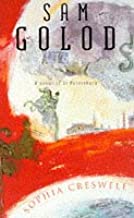Part two of this review is here.

Sam Golod’s heroine, Natalie, is a young English woman spending a post-degree year in St Petersburg in 1992, in the chaos of uncertainty and reckless opportunity of that astonishing time of state collapse.
It is as if she —along with her Russian friends— has fallen through a civilised overlay into a world of elemental passions, violence, and greed.
Sophia Creswell depicts strikingly the chasm between the street-level life into which Natalie has been pitched, and the world of the middle-class English life she had enjoyed back home; a world still inhabited by the British diplomat, ensconced in the grandeur of the Astoria Hotel, to whom she fruitlessly turns for help in crisis.
And it’s not just the gap between officialdom and Natalie’s ‘real’ Russian life that Creswell highlights. Natalie is so absorbed into the life of her Russian friends that even a fleeting meet-up with some British students resonates with other-ness.
I went to the Herzen Institute and drank coffee in their canteen, while eavesdropping on the Western students on language placements. Some of them came from the Oxford Poly where I had been. I went up to their rooms, but it was no use; I didn’t belong and I had forgotten how to make conversation. They were on their way back to England so I gave them some letters to post and they gave me their books and their ration tickets.
Sam golod, p. 85
It is wonderfully evocative for the few of us who were students or lived in Russia at that time. Sending letters to be posted back home rather than trusting the postal service. Divesting oneself of various encumbrances and now-useless fripperies —books and ration tickets— before being released back into the West.
Creswell notes too the vivid sense in those years that it was never clear who was in charge, but whoever it was, they were in it for themselves. Pyotr accuses Natalie of not grasping the confusion of life in Russia in the early 1990s.
You have such convenient categories. What do you mean mafya? There are all sorts of different kinds of mafya: the Chechens are mafya, the artists from Pushkinskaya and Alexey Andreev are a kind of mafya and the Party is still the biggest mafya or all. Do you really think that one kind of mafya is better than another?
sam golod, p, 48
In Sam Golod the world is one of recklessness, easy drugs and easy alcohol and easy sex, casual violence and calculated violence, and an enticingly rootless and rule-less community of characters entwining their lives and insinuating themselves into the hopes and fears of others.
Pyotr and his ilk find themselves, as many young Russians in those days, caught between the exhilaration of that anarchic time, and the hard necessity to get by and make a life for themselves.
It is no surprise that naïve English girl Natalie fails to get a grip on what is happening around her. There is a neatly observed scene which presages the Russia that is emerging around her; Natalie meets a thuggish, thick-set, skin-headed ‘businessman’ —‘a fat man in a cheap, limp suit’, who is ‘setting up a bank in the next door flat’ (pp. 172-173).
I looked at him and he laughed a deep gut laugh with wet lips. ‘Times they are a-changing,’ he sang with a very thick accent. ‘Bob Dylan.’ He cut out more slabs of laughter from his chest. ‘Five years in the gulag and now I am a businessman. The camps are the best business schools in the world, you have to be hard. You will see, soon nobody will be able to beat Russian businessmen.’
I asked him what kind of business he did and he treated me to a baby-eating grin. ‘Banking, forestry, light metals, import and export, construction work. I will turn my hand to anything but you have to watch everyone. They are all crooks, everybody is a crook. They will steal your equipment, steal your grandmother. Everybody needs protection.’ Was he threatening us? He fixed his eyes on me and slapped the table again.
‘And what kind of bank will it be?’ I asked in horror.
‘International,’ he said grandiosely. ‘The International Bank of Friendship … So, old-fashioned young English girl! Ha! What are you thinking of? Marble halls eh? This will be a private bank, just for friends. A fax, a telephone and a computer.
sam golod, pp. 173-74
It is more of a surprise when Natalie shows an increasingly astute and hard-edged character as even her controlled chaos collapses into something still more tumultuous.
Sam Golod develops and deepens as it goes. It took hold of me in a way which the opening chapters never suggested was possible. It will stay with me. It also leaves me longing to know how much of it is fictionalised memoir, and how much just fiction.
I have bought Creswell’s only other Russia-related novel, Red Tape (1998). It has been sitting on the Russia-in-fiction ‘to be read’ shelf for a while. When it has been, a review will be posted.
Part two of this review is here.